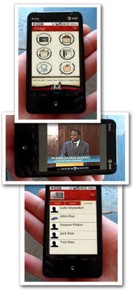Last weekend when we received some urgent email prayer requests from our teammate Jerry, who is in Kenya launching a new project, we asked you to pray.
As you may remember, our team has been working for months on a very exciting opportunity using mobile phone technology to offer seminary courses to help train pastors in Kenya.
In sub Sahara Africa, church growth is exploding, yet there are extremely few trained pastors. Additionally, seminaries in Africa often can not train enough students nor can the students afford to travel to the seminaries to take the Bible courses.
So, a forward thinking Nairobi seminary decided to offer distance education via cell phone. They are trying it out for one course this semester and hope to expand it in the spring. To learn  the details of how the seminary course will work, read the short explanation on our teammate Jerry’s web site.
the details of how the seminary course will work, read the short explanation on our teammate Jerry’s web site.
Although there have been numerous big problems in launching this seminary project, the class started Monday. A full slate of eager Kenyan students received their phones pre-loaded with the course material and software to administer their quizzes and facilitate class discussions via text messages. Now the students will return to their homes scattered around Kenya – allowing them to work during the semester and to continue serving in their churches.
Here’s a recent update from Jerry:
“Today we completed the first mLearning Class introduction. In addition to the approx 30 students pre-registered, there were 10 students who registered and paid within one hour of the beginning of class.
Class Observations:
- Overall I think the day was successful. Students ended the day excited about what they were beginning and grateful for the opportunity to participate in this. No one was frustrated. At least no one expressed frustration. We have a lot we can improve, but I think we made a good start today!
- The coursework software required data service which we provided via WiFi (wireless Internet), but during that time some students started browsing on the Internet, not realizing that they were accessing the Internet. I don’t think any of the students understood what data service is and what applications on the phone required it. None of them understood what WiFi was or what you would use it for. It would be much easier if we could block all the services that require data access and only show them if data is turned on.
- The average student was able to learn the basics soon enough, but with some more guided/restricted training it could have gone faster. Students who had no previous experience with technology took longer to get familiar with the OS.
- Pastor Robert Murari (to whom we gave a phone) called just before class started and said the video playback was failing on his phone. I promised him a replacement memory card. This confirmed our fear that the locally purchased memory cards were of insufficient quality to work.
- Some felt comfortable and made quick progress. Others were writing down instructions on paper for the most basic operations at the end of the day.
- One of the pastors said he did not have electricity at his house and that charging the phone might be a problem.
Returning to the seminary was much more of a problem for the students than loading more airtime credit. Most of the pastors were from places far from Nairobi.”